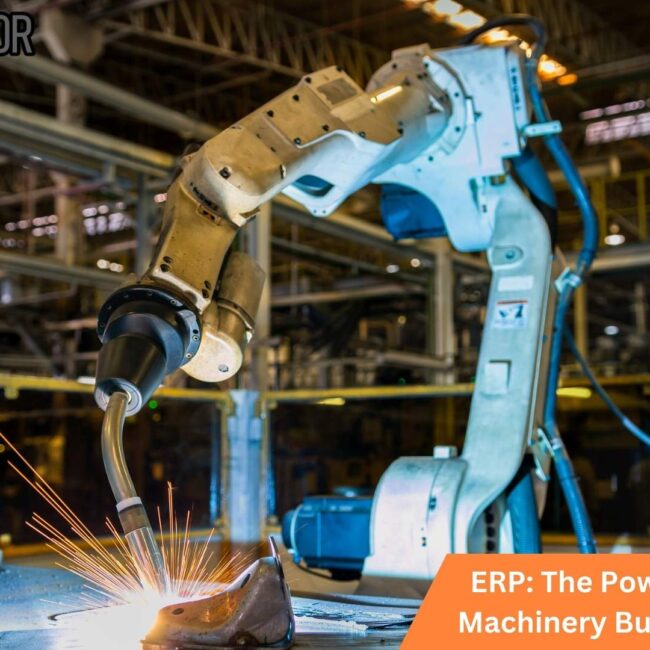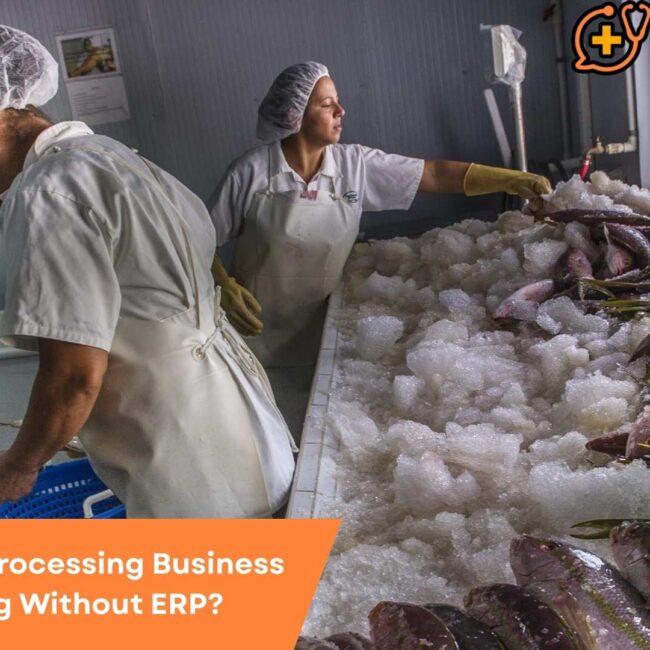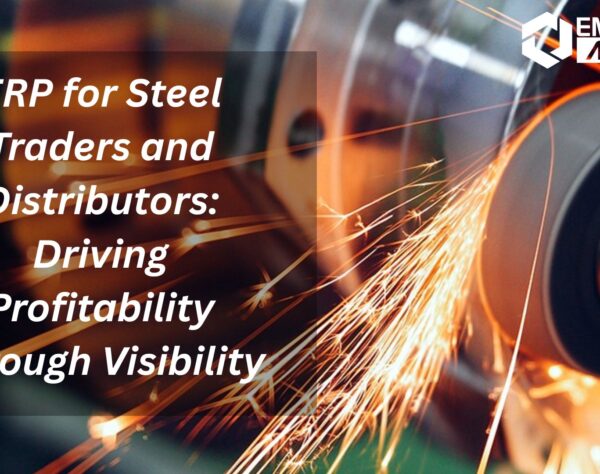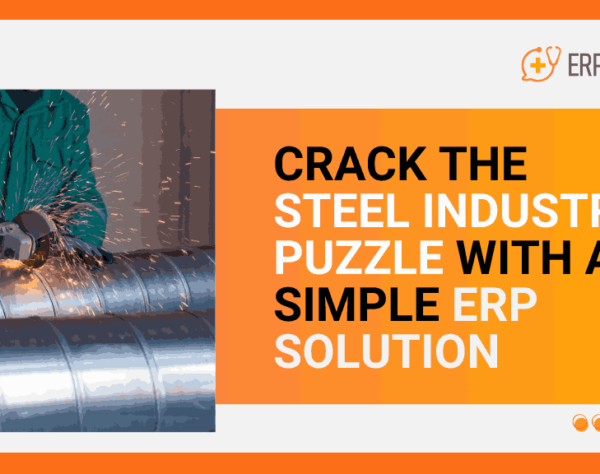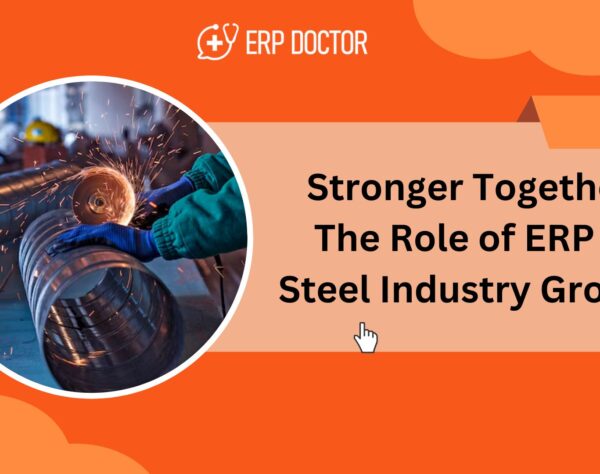
Steel Yourself for Success – ERP is the Answer!

Why ERP is the Backbone of Success in the Steel Industry
The steel industry has always been a pillar of global infrastructure and industrial development. From towering skyscrapers and bridges to complex machinery and vehicles, steel plays a foundational role in nearly every aspect of modern life. However, the production and distribution of steel are not without challenges.
The steel industry faces intense pressure from volatile raw material costs, complex manufacturing processes, and ever-tightening quality regulations. Add to this the increasing demand for sustainable production and faster turnaround times, and you have a sector on the edge of a major transformation.
This is where ERP (Enterprise Resource Planning) emerges as a game-changer. ERP systems provide a centralized platform that streamlines production planning, inventory management, customer relationship management, and financial operations — all in real-time. ERP not only helps steel companies survive market turbulence but also positions them to thrive by improving efficiency, enhancing quality, and reducing costs.
In this blog, we’ll explore how ERP is transforming the steel industry, the specific challenges it solves, and why steel companies need to embrace this technology to stay competitive.
The Steel Industry’s Biggest Challenges
1. Complex Production Processes
Steel manufacturing involves a series of intricate processes — from melting and casting to rolling and finishing. Coordinating these processes manually increases the risk of production delays, equipment failures, and quality issues.
For example, a delay in the casting process could create a bottleneck in the rolling stage, leading to higher costs and missed delivery deadlines. Without an integrated system, it’s difficult to spot and address these inefficiencies in real-time.
2. Fluctuating Raw Material Costs
The steel industry heavily depends on raw materials like iron ore, coal, and scrap metal. Price volatility in global markets can disrupt budgeting and financial planning, leading to profit losses.
Steel manufacturers need a system that provides real-time cost analysis and predictive insights to adjust procurement strategies and manage production costs effectively.
3. Quality Control and Compliance
Steel products are used in critical infrastructure and industrial applications where failure is not an option. Meeting quality standards and ensuring product consistency are essential.
Failure to meet these standards can lead to rejected shipments, regulatory penalties, and reputational damage. Without a real-time quality monitoring system, maintaining consistency across production batches becomes challenging.
4. Inventory Management and Supply Chain Issues
Managing the supply chain in steel manufacturing is complicated by fluctuating raw material availability, transportation delays, and warehouse storage limitations.
Overstocking increases holding costs, while understocking can halt production and lead to missed deadlines. Steel companies need a system that balances supply and demand in real time.
5. Sustainability and Waste Reduction
Steel production is energy-intensive and generates significant waste. Meeting sustainability targets requires better control over production efficiency and resource utilization.
An effective ERP system can track waste levels, energy consumption, and emissions — helping steel manufacturers meet environmental standards while improving operational efficiency.
How ERP Solves Key Challenges in the Steel Industry
ERP systems bring together all business functions — production, inventory, sales, quality control, finance, and HR — under one unified platform. This enables steel manufacturers to manage operations more effectively and gain real-time visibility into business performance.
1. Unified Production Planning and Scheduling
ERP systems provide detailed production planning capabilities, enabling manufacturers to:
✔️ Schedule production based on demand forecasts.
✔️ Allocate resources efficiently.
✔️ Identify and resolve production bottlenecks.
👉 Example: A steel mill reduced production downtime by 30% after using ERP’s automated scheduling tool.
2. Real-Time Inventory and Material Tracking
ERP allows steel companies to track raw materials, work-in-progress, and finished products in real time. This prevents stockouts, overstocking, and material wastage.
👉 Example: A leading steel manufacturer reduced material waste by 15% after implementing an ERP-based inventory tracking system.
3. Improved Financial Management and Cost Control
ERP systems provide real-time financial data and cost breakdowns, allowing companies to identify areas where they can reduce expenses.
✔️ Monitor cash flow and expenses.
✔️ Forecast market trends and adjust pricing strategies.
✔️ Control operational costs at every stage.
👉 Example: A steel manufacturer increased profit margins by 18% after implementing ERP-based cost control.
4. Enhanced Quality Control and Regulatory Compliance
ERP helps steel manufacturers enforce quality standards by automating inspection processes and monitoring production metrics.
✔️ Track product specifications.
✔️ Identify defective products early.
✔️ Generate compliance reports automatically.
👉 Example: A steel plant improved product quality consistency by 25% after using ERP for automated quality control.
5. Efficient Supply Chain Management
ERP provides visibility into supplier performance, delivery schedules, and transportation costs. It allows steel manufacturers to optimize logistics and improve supplier collaboration.
✔️ Automate supplier order management.
✔️ Track shipment status in real-time.
✔️ Improve supplier accountability.
👉 Example: A steel distributor cut supply chain costs by 12% after using ERP for supply chain optimization.
6. Data-Driven Decision Making
ERP provides real-time insights into business performance, enabling companies to make data-backed decisions quickly.
✔️ Analyze production efficiency.
✔️ Monitor financial health.
✔️ Forecast market demand.
👉 Example: A steel company increased production efficiency by 10% after using ERP to monitor equipment performance and production output.
7. Predictive Maintenance and Equipment Monitoring
ERP integrates with machine sensors to monitor equipment health and predict maintenance needs before breakdowns occur.
✔️ Prevent unplanned downtime.
✔️ Extend the lifespan of equipment.
✔️ Optimize maintenance schedules.
👉 Example: A steel manufacturer reduced equipment downtime by 22% after implementing ERP-driven predictive maintenance.
Why ERP is the Perfect Fit for Steel Companies
🔹 Scalable and Flexible: ERP systems can grow with the business and adapt to changing production needs.
🔹 Comprehensive Reporting: Customizable dashboards and reports provide deep insights into business performance.
🔹 Automation and AI: Automation of repetitive tasks reduces human error and increases efficiency.
🔹 Cost Reduction: Improved efficiency and better resource management lead to lower operational costs.
🔹 Sustainability: ERP helps track emissions and waste levels, supporting environmentally friendly production.
The steel industry operates in a highly competitive and complex environment. ERP systems provide the tools needed to improve efficiency, reduce costs, and maintain quality. By centralizing business functions and automating key processes, ERP helps steel manufacturers operate more efficiently and respond quickly to market changes.
If your steel business is facing production challenges, supply chain issues, or rising costs, ERP is the answer. It’s time to steel yourself for success — and ERP is the foundation to build it on.
FAQs
1. How does ERP improve production efficiency in steel manufacturing?
ERP automates production scheduling, tracks output, and identifies bottlenecks to optimize efficiency.
2. Can ERP help steel companies manage raw material costs?
Yes, ERP tracks material usage and market trends, helping companies adjust procurement strategies.
3. How does ERP enhance supply chain visibility for steel companies?
ERP provides real-time tracking of supplier performance, delivery times, and inventory levels.
4. How does ERP support quality control in steel production?
ERP automates inspection processes and monitors product specifications for consistency.
5. Can ERP reduce production downtime in steel manufacturing?
Yes, ERP’s predictive maintenance tools help prevent equipment failures and reduce downtime.
6. How does ERP help steel companies meet sustainability goals?
ERP tracks energy consumption and waste levels, helping companies improve environmental performance.
7. Can ERP integrate with existing machinery and production systems?
Yes, ERP platforms are highly configurable and integrate with most industrial systems.
8. How does ERP improve customer service for steel companies?
ERP streamlines order processing and provides real-time shipment tracking for better customer experience.
9. How does ERP increase profit margins in the steel industry?
ERP improves operational efficiency, reduces costs, and enhances decision-making.
10. Is ERP suitable for small and mid-sized steel manufacturers?
Yes, ERP systems can be tailored to fit the needs and budget of companies of any size.


